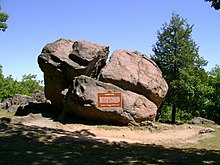William Goffe | |
|---|---|
 Judges' Cave, where Goffe and Edward Whalley reputedly hid during the early part of their exile in New England | |
| Member of Parliament for Hampshire | |
| In office September 1656 – February 1658 | |
| Rule of the Major-Generals, responsible for Berkshire, Sussex and Hampshire | |
| In office November 1655 – January 1657 | |
| Member of Parliament for Yarmouth | |
| In office September 1654 – January 1655 | |
| Personal details | |
| Born | c. 1613 to 1618 Uncertain, probably Sussex |
| Died | c. 1679 New England |
| Resting place | Thought to be Hadley, Massachusetts |
| Nationality | English |
| Spouse | Frances Whalley (c. 1650) |
| Children | Anne; Elizabeth; Frances |
| Military service | |
| Rank | Major General |
| Battles/wars | |
William Goffe, c. 1613/1618 - 1679/1680, was a religious radical from London who fought for Parliament during the Wars of the Three Kingdoms. Nicknamed “Praying William” by contemporaries, he approved the Execution of Charles I in January 1649, but escaped prosecution as a regicide by fleeing to the New England Colonies.
Goffe held several senior military and political positions under the Commonwealth, including administrator of Berkshire, Sussex and Hampshire during the Rule of the Major-Generals from 1655 to 1657. A close associate of Oliver Cromwell, to whom he was distantly related by marriage, he lost most of his political influence after Richard Cromwell resigned as Lord Protector in April 1659.
Shortly before the Stuart Restoration in May 1660, Goffe sailed for Boston with his father-in-law and fellow regicide General Edward Whalley. Sheltered by Puritan sympathisers in New England, little is known for certain of his life there. It was once suggested he was the Angel of Hadley, a figure who in 1675 allegedly helped repulse an attack by Native Americans, but this is disputed on various grounds. He died sometime after April 1679, the date of his last known letter to his wife, and is thought to have been buried in Hadley, Massachusetts.